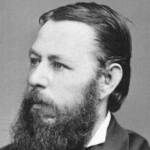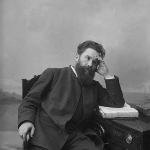Background
Tatyana Alexandrovna Bogdanovich was born on August 3 (15), 1872 in Saint Petersburg, Russian Federation. Her mother died, when she was three. Her uncle and aunt - A.N. Annenskaya and N.F. Annensky - became her stepparents.

The Higher Women's (Bestuzhev) courses
Mariinsky Gymnasium in Nizhny Novgorod
Tatyana Alexandrovna Bogdanovich was born on August 3 (15), 1872 in Saint Petersburg, Russian Federation. Her mother died, when she was three. Her uncle and aunt - A.N. Annenskaya and N.F. Annensky - became her stepparents.
In 1890 Tatyana Alexandrovna graduated from the Mariinsky Gymnasium in Nizhny Novgorod with a gold medal. In 1896 she graduated from the historical and philological department of the Higher Women's (Bestuzhev) courses in Saint Petersburg.
Her literary and journalistic activities were begun in the magazine Mir Bozhiy because of the translation of the essay Unknown Japan. In 1907, Tatyana Alexandrovna was a correspondent for the Parus newspaper.
In 1908 - 1917 Tatyana Alexandrovna was the editor of a literary supplement in the newspaper Sovremennyy mir. She had published articles and translations in such magazines as Novy Zhurnal Dlya vsekh, Russkoe bogatstvo, and Russkie zapisky.
In the twenties on the advice of S.Ya. Marshaka Tatyana Alexandrovna began to write for children and became a popular children's writer. She had published some historian books for children, which, unfortunately, have not been reprinted for a long time.
In 1918 Tatyana Alexandrovna became a leading publicist in the newspaper Sovremennyy mir. In September, at the invitation of Korolenko, she moved to Poltava in order to work on the first part of the Biography of V.G. Korolenko.
After 1917, readers were particularly interested in her book People’s love of the sixties. In addition, Tatyana Alexandrovna translated some works of F. Engels, G. Spencer, G. Maupassant, J. Verne, M. Meterlink, B. Kellerman, S. Lewis, and others.
In 1898 Tatyana Alexandrovna married A.I. Bogdanovich. He was a Russian literary critic, publicist and social activist. She had four children (one son and three daughters). In 1938 the eldest daughter died in prison in Kharkov. Her son was killed in the war in 1941.




